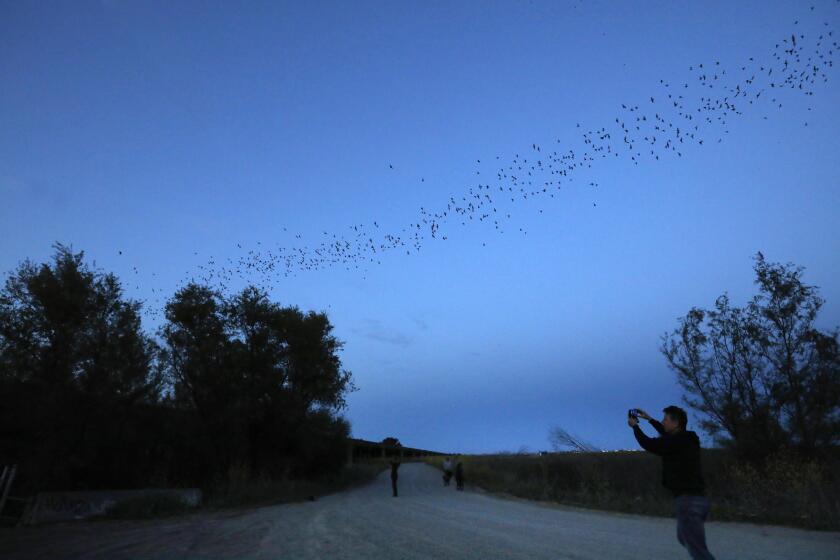Biros, Prams and Lorries : The Mother Tongue Wags Differently on Opposite Sides of the Atlantic
MIKE WELDS of Laguna Hills sends me a page from the London Daily Mail listing the many modern gadgets and conveniences that the British didn’t have when World War II began in 1939.
In America, the craze for listing all the things we didn’t have only half a century ago was begun by Nardi Reeder Campion in an article she wrote for Wellesley Magazine about the items unknown to her Wellesley graduating class of 1938.
Since then, dozens of people have appropriated her list for reading at their own class reunions; I have pirated it myself.
Naturally, since our worlds are much alike, the British would have been without most of the same things in 1939. What is curious, though, is that we gave different names to those various items when they did come along.
I have always admired the British for their courage and endurance through the hardships of that war: the sacrifices on the home front, the separation of children from their families, life in the bomb shelters during the London blitz, the selfless daring of the Royal Air Force above the channel.
It is almost beyond comprehension, though, that the British underwent such rigors without tea bags, tumble dryers, washing-up liquids and disposable nappies.
They were also without nylons, sliced bread, electric blankets, facial tissues, antibiotics, credit cards, biros , plastic bags, non-stick pans and transistor radios.
A biro , according to “British Self-Taught” (Macmillan), by Norman W. Schur, is a ballpoint pen, and washing-up liquids, I assume, are detergents or other liquid cleansers.
We are told that the British also had no aerosol sprays, baby buggies, frozen foods, butane cigarette lighters, car telephones, supermarkets, electric guitars or roll-on deodorants.
One wonders about the unpleasantness of a night huddled up with hundreds of others in an air-raid shelter without the blessing of roll-on deodorants. The British are a hardy people.
It is curious that the Mail says baby buggies rather than prams . Schur comments: “I find that American usage tends to be more literal. We say ‘baby carriage’ and the English say ‘pram’ (an abbreviation for perambulator). Any Englishman would understand baby carriage, but no recently arrived American (unless steeped in Christie, Sayers and Allingham) would know what a pram was. The same would apply to cleaning woman and char or ballpoint pen and biro . It general, it appears that American expressions are easier for Englishmen than the other way around.”
I believe that most Americans would know what pram means, though certainly not biro . The Mail also lists several words that, though not used in this country, would be understood by most Americans: motorways, shopping trolleys, betting shops, entry phones to flats, and traffic wardens.
We must keep in mind that this list is a contemporary list and does not reflect words in use in 1939, since the point is that none of these things existed in 1939.
The absurdity of this situation, though, is that it really doesn’t matter what one calls something that one didn’t have because it didn’t exist.
The Mail also notes, however, “the surprising things the British did have” in 1939, including jukeboxes, contact lenses, instant coffee, filter-tip cigarettes, hair dryers, vacuum cleaners, central heating and Radio Luxembourg. There were, the Mail says, 20,000 TV sets in the London area (an improbable number, it seems to me, for that year).
It is true that many common things have different names in the two countries: pub for bar, motor car for automobile, bonnet for hood, tram for streetcar, lorry for truck, lift for elevator, solicitor for attorney, sweets for candy, starters for appetizers and knickers for panties.
Knickers I find especially enchanting. Of course, we can’t adopt it in America, because here it is short for knickerbockers, which are known in England as plus fours.
As Schur notes, the differences between English and American English have inspired a number of witticisms, including Winston Churchill’s remark that Britain and America are two countries separated by a common language. And Oscar Wilde’s quip: “The English have everything in common with the Americans, except, of course, language.” And Russell Baker’s observation in a column datelined London: “One of the hardest things for an American to learn is English.”
H. L. Mencken said that English English is only a dialect of American. But English is still the mother tongue. As Winston Churchill said after Dunkirk:
”. . . we shall fight on the beaches, we shall fight on the landing grounds, we shall fight in the fields and in the streets, we shall fight in the hills; we shall never surrender.”
Everybody understood that.
More to Read
Sign up for Essential California
The most important California stories and recommendations in your inbox every morning.
You may occasionally receive promotional content from the Los Angeles Times.







